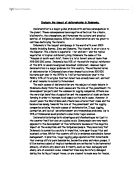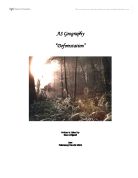There are conflicts between indigenous people such as the Moi people and the logging companies, for example the Intimpura Timber Company. The logging company threatens the way of life of the Moi people. The government granted a logging licence to the company in 1990 for 339 000 hectares of land. The traditional landowners were not informed and representations by the Moi to the local government, the army, and the company and forestry service have had no effect. None of them will recognise any form of land rights by the Moi people. As a result of their protests the Moi have been labelled ‘security disturbers’ in an effort to silence them.
Illegal logging will vastly increase the risk of fire. Forest degradation and land clearance were the root causes of the 1998-9 fire disaster that blanketed nearly 20 million people across south-east in smoke for months, with disastrous consequences for local health. A major problem that resulted from these fires was that the smoke spread to Malaysia causing serious air pollution. The smoke was not only dangerous to people’s health, but the industrial and automobile pollutants trapped below the smoke were also a major threat. People were forced to wear special masks, private and public schools had to close, and some airline flights had to be cancelled due to poor visibility. The government declared it to be a state of emergency. Kuala Lumpur was greatly affected by the smog, 2700 adults and 3800 children were treated for infections, over 1000 for asthma related illnesses and about 500 for eye problems. Any Air Pollution Index over 500 is dangerous to people’s health, in Malaysia it was above 800.
Continuous deforestation may also result in severe flooding; in October 2000, districts surrounding one of the national parks where logging had been taking place suffered major flooding that led to deaths, the destruction of roads and crops, and caused local food shortages.
About half of all known species of living things come from rainforests. Indonesia has the largest number of mammal species, over 20 000 plant species, and 17 percent of the worlds birds and many species have still to be discovered. With the destruction of the forest, species become extinct everyday, biodiversity and biomass are reduced, and the rates of net primary productivity are decreased. Tigers, orang-utan, gibbons, rhino, bears, elephants, crocodiles and thousands of other species in Indonesia are dependant on intact forest, and therefore face a serious risk of extinction due to habitat destruction.
The clearance and burning of the rainforests may also be the cause of irreversible global climatic change. Huge amounts of carbon dioxide from the carbon that had previously been locked up in the biomass of the rainforest are suddenly released into the atmosphere. This traps out going long wave heat radiation from the Earth within the atmosphere – the greenhouse effect. This may be causing global warming. As a result sea levels are likely to rise, since the volume of water in the oceans will increase due to the general expansion of water as the oceans become warmer and glaciers and polar ice caps melt.
Forest clearance also has far reaching effects on global rainfall patterns, since water vapour is no longer passed into the atmosphere from the trees by evapotranspiration, but becomes surface runoff instead. This absence of atmospheric water vapour may cause the amount of precipitation to be reduced or bring lengthy periods of drought, which increase the likelihood of desertification.
However, deforestation can be said to have significant advantages for certain communities. Countries in the MEDW are making a great profit out of the deforestation of the tropical rainforest, extracting the precious timber they need for industrial use. Unemployment rates have decreased as a result of deforestation as timber production provides jobs and income that are much needed and contribute to debt relief but illegal logging means that the government does not get full advantage from this activity. The effect on unemployment may be short term because the forests are a finite resource, the forest is rapidly diminishing in size and jobs are disappearing. From the timber extractors point of view primary forest logging is very attractive as effectively it is an opportunity to get something for nothing, the returns are enormous, often 50% and the risk is small. The people of Indonesia can use the rainforest to its economic benefit with the development of the countries wood processing industries. Production capacity has increased by nearly 700% in the pulp and paper industries, making Indonesia the worlds ninth largest pulp producer and eleventh largest paper producer. Indonesia’s economic success in the 1980’s and 1990’s was based in part on the growth of this forest related industry. Tens of millions of Indonesians depend directly on forests for their livelihoods, whether it is gathering forest products for their daily needs or working in the wood processing sectors of the economy. For many logging is a stable income source. The exploitation of forest resources has been a significant factor in Indonesia’s rapid economic development since the early 1970’s.
There are alternatives that could minimise the impact of deforestation in Indonesia. These alternatives are focused on the forest sector, the land uses that compete with the forests, and the government policies that guide development. They are grouped into 3 broad categories: the protection and management of remaining forests, socio-economic development, and policy and institutional reforms. One of the most direct ways to arrest deforestation is to create networks of protected areas where forests are protected from encroachment. For forests to continue to perform their vital environmental functions and exert their enormous economic potential they need to be managed, the move needs to be made from exploitive logging to wise forest use, sustainable timbre harvesting needs to be put into practice. Replanting harvested areas should also be encourages. Indigenous tribal communities need to be allocated large areas of unexploited forest as tribal reserves in which they would be permitted to continue their traditional sustainable existence without interference. Compensation for not felling the forest might be offered in the form of healthcare and similar schemes. Areas of forest that have not been felled must be carefully preserved and remain untouched. Many such areas can become wildlife reserves and national parks. They may have tourist potential, providing valuable income for a developing nation if such development can be achieved without causing damage to the forest. If core areas of undisturbed forest are left adjacent to carefully managed logging areas, displaced plant and animal species should be able to recolonise the logged forest after operations have finished.
Another potential solution is what has been called ‘debt for nature’ swaps. At the heart of such a scheme is the fact that developing nations such as Indonesia are crippled by foreign debt. The reckless exploitation of the rainforests and the sale of tropical hardwoods to developed countries in the MEDW generate badly needed hard currency to help repay loans and interest. The cleared land can also be used for a few years to produce an income from cash crops or cattle ranching. Debt for nature schemes allow international conservation organisations to provide a debtor country with some relief from, and rescheduling of, their debt burden in exchange for guarantees that some of the money that would otherwise have been used for debt repayments is instead out towards conservation schemes and projects to protect the environment.
On the whole it is felt that the negative impact of deforestation of the Indonesian rainforest totally outweighs the advantages. However, the consequences of the disadvantages take a long time to come about and do not affect the people of Indonesia directly. For example the global effects of deforestation such as the greenhouse effect, global climate and patterns of rainfall worldwide are seen to be important by everybody including Indonesians, as far they are concerned they are remote and removed from their everyday experience. People in developing countries are more concerned with employment, with earning enough money to survive. Their governments want desperately to boost their economies to achieve greater prosperity such as they see in the MEDW and this is their priority. The important thing for the future of the planet will be to establish a system that both protects the environment and respects the legitimate aspirations of developing. The concept of sustainable development as put forward by governments of the MEDW offers a way forward. As Paul Jepson, a researcher at Oxford’s School of Geography, said:
“ We hope that not only the Indonesian government but also donor governments, industry, the scientific community and the conservation movement will unite in the face of the unprecedented forest loss to take positive action to protect Indonesia’s forests.”







